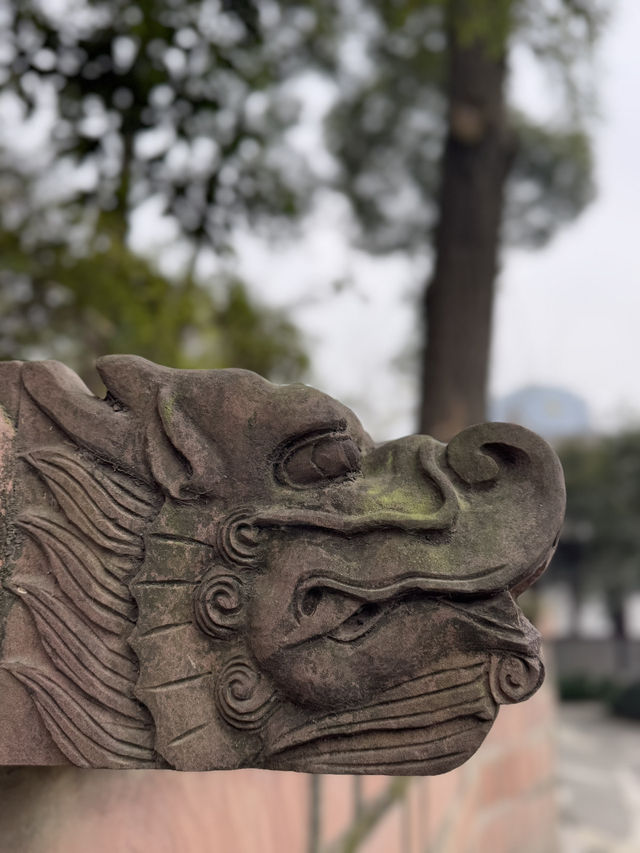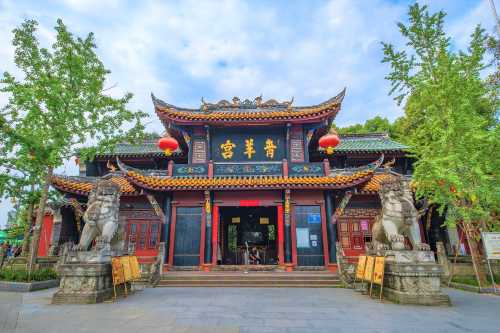Chengdu Qingyang Palace | A New Cultural Trend Next to the Ancient Taoist Temple: A Clever Blend of Tradition and Modernity A visit to Chengdu's Qingyang Palace reveals not only the solemnity and vibrant incense offerings of the temple, but also a vibrant world of creative arts and culture beyond the palace gates. A dazzling array of cultural and creative shops surround the area, selling items inspired by Taoist culture and Bashu elements. The Qingyang Palace symbol, the "Green Sheep," has been transformed into adorable figurines and pendants, creating a playful yet culturally rich experience. Taoist elements such as the Bagua (Eight Trigrams) and talismans have been incorporated into postcards, bookmarks, and canvas bags, creating both aesthetic appeal and auspicious meanings.
諸文武
Chengdu Qingyang Palace | Dantai Bidong, a Profound Place for Taoist Cultivation and Spiritual Realm Within Chengdu's Qingyang Palace, a majestic and diverse collection of halls lies a mystical haven for cultivation, the Dantai Bidong. According to legend, Dantai Bidong was a place for alchemy and spiritual practice. "Dan" symbolizes the true essence of the Great Dao, while "Bidong" signifies a tranquil and profound spiritual realm. This was once a place where Taoists of all generations practiced in seclusion, seeking to comprehend the Way of Heaven, and is a vital part of the Qingyang Palace's cultural heritage. The cave, with its ancient stone walls and shaded by lush greenery, exudes a tranquil atmosphere steeped in the serenity of time. Visitors stepping inside often find themselves feeling a sense of calm and tranquility. While not as bustling as the main hall, this place embodies a sense of "returning to nature," reminding us that spiritual practice lies not in bustle but in spiritual purity.
諸文武
Qingyang Temple | Chengdu, the Source of Taoism, the Root of Millennia-Old Faith in Bashu Chengdu is known as the "Land of Abundance," and as the most representative Taoist holy site in western Sichuan, Qingyang Temple is hailed as the "Source of Taoism in Chengdu." This name is more than just a title; it epitomizes a history. Originally built during the Zhou and Qin dynasties, it flourished during the Tang and Song dynasties. After millennia of renovation, Qingyang Temple has become one of the most influential Taoist temples in the Bashu region. It enshrines the Jade Emperor, the Three Pure Ones, and the Jade Emperor, with towering halls, ancient cypresses, and a vibrant incense-filled city. "Chengdu, the Source of Taoism," the four characters "Chengdu, the Source of Taoism" capture the significance of Qingyang Temple: it is the root of Chengdu's religious culture and a spiritual haven for the people of Bashu. From here, countless practitioners have discovered the wisdom of "Tao follows nature"; from here, Chengdu residents have internalized a leisurely, harmonious, and relaxed approach to life, becoming the very essence of the city.
諸文武
Chengdu Qingyang Temple | The Hunyuan Hall: Majestic and Respectful, the Bodhisattva Hall: Compassionate and Illuminating As Chengdu's most representative Taoist temple, Qingyang Temple boasts a diverse array of halls, each with its own distinct charm. The Hunyuan Hall and the Bodhisattva Hall, contrasting with each other in a unique combination of strength and gentleness, perfectly embody the Taoist principle of "dignity and compassion coexisting." The Hunyuan Hall, dedicated to the Great Emperor Hunyuan, boasts a majestic and solemn atmosphere, attracting a constant stream of worshippers year-round. The awe-inspiring statue within symbolizes the unwavering energy of heaven and earth, protecting the Taoist temple's purity and suppressing all evil spirits. Worshippers visit the hall to pray for career stability and peace of mind, while also serving as a reminder to cultivate a harmonious and flawless spirit like the Hunyuan Qi. In contrast, the Bodhisattva Hall offers a warm and peaceful atmosphere. The golden statue of the Bodhisattva sits upright, his brows lowered, his expression compassionate and solemn. The ringing of bells and the lingering fragrance of incense within the hall invite a calming mood. Believers often pray for family harmony, children's safety, or to find comfort for their inner sorrow.
諸文武
Chengdu Qingyang Temple | The Thunder and Fire General's Mighty Awe, His Thunderbolt Flames Protect the Dao Besides Taishang Laojun and the numerous celestial deities at Chengdu's Qingyang Temple, one can also witness the majestic guardian deity, the Thunder and Fire General. The deity's statue within the temple features a stern face and piercing eyes, wielding a thunder and fire instrument, and surrounded by images of thunder and flame. He presides over the power of thunder and fire, symbolizing the heavenly way of punishing evil and protecting righteousness. Thunder destroys evil spirits, and fire incinerates foul spirits. Combined, they become the unwavering force that protects the temple and upholds the law. Worshippers often pray for the warding off of disasters and a peaceful home. Some also pray for career development to be as unstoppable as thunder and fire. As the incense curls upward within the temple, the solemn aura inspires awe, reminding practitioners that the way of thunder and fire is not only about intimidation but also about purification.
諸文武
Chengdu Qingyang Palace | The Towering Mountain Gate, the Stately Gate of the First Taoist Temple in Bashu On the west side of downtown Chengdu, amidst the ancient charm of Sichuan, stands the Qingyang Palace, the largest Taoist temple in Sichuan. Its mountain gate is the most imposing entrance to this thousand-year-old temple. The tall and imposing mountain gate, framed by vermilion pillars and green-tiled eaves, bears the powerful inscription "Qingyang Palace" on the lintel. Pilgrims flock to the gate, often pausing to adjust their attire and pay respect before entering. At this moment, the mountain gate serves not only as the entrance to the building but also as the dividing line between the mundane and the sacred. Passing through the mountain gate, one is greeted by towering ancient cypresses and numerous temples, creating a solemn and majestic atmosphere. Unlike the compassionate atmosphere of Buddhist temples, the Qingyang Palace's mountain gate embodies a Taoist sense of ethereal freedom, reminding one: "To enter the Dao, one must possess a pure and tranquil mind."
諸文武
#chinatravel Spent a day temple hopping around Chengdu in Sichuan Province and it was honestly such a vibe. Each temple has its own energy, and it’s the perfect way to slow down and soak in the peaceful side of the city. Started at Wenshu Monastery which was super calm and had monks chanting softly in the background. The tea garden there is a must, I sat with a cup and just chilled under the trees for like an hour. Then hit up Qingyang Palace, which has Taoist vibes and some wild looking statues. The whole place feels super balanced and kind of magical. Also stopped by Daci Temple which is right in the middle of the city but still quiet once you step inside. The contrast between ancient temples and modern buildings is actually kinda cool. If you want a break from the city noise and a little dose of calm, temple hopping in Chengdu totally hits. Just go with the flow, light some incense, and enjoy the moment.
Nengkh9
Popular Trip Moments
Chengdu Gems ✨ | Magical Ancient Vibes at Dujiangyan 🏯🌲 | Rainy River Walk🌧️ | The calligraphy class at Hegu Mountain Residence is absolutely amazing! Both kids and adults had a blast | Right at Qingcheng Mountain in Chengdu, I finally stayed at the hotel I’ve been wanting to visit so | Chengdu 1h|Private Hot Spring Deep in the Forest | RV Self-Drive Tour of the Western Sichuan Mini Loop | Say goodbye to the crowded peak season and check in at the most beautiful Sichuan-Tibet Line | At the foot of Mount Qingcheng, a private hot spring embrace|An autumn and winter healing appointment at Yunfuli Yunshu Qingcheng Houshe | Stunned by the Christmas tree high above Chengdu! 270° floor-to-ceiling windows overlooking Taikoo Li | 1 hour direct to Chengdu! Bringing Hayao Miyazaki’s fairy tales into autumn, the kids had a blast! | Zhongshuge Library | The pink muhly grass at Manhua Manor is so dreamy | Chengdu Eats🍲 | One-Day Tour of Three Kingdoms Culture | A Stroll Guide to Misty Rain at Jinli | Departing from Chongqing to Jiuzhaigou with fewer crowds and beautiful scenery | Special Forces Stay at Hotels: Chengdu Edition 478 | City Eats by tripcom🍲 | 1 hour around Chengdu! A serene hiking secret spot you won’t want to share | Ancient Magic ✨ | Chengdu Trip: Exploring the Beauty of Nature | Chengdu Vegetarian Restaurant 枣子树素餐馆 | Subway direct access! Watch Happy Mahua's play in Chengdu! | A park in downtown Chengdu combining kid-friendly fun, autumn viewing, and cyberpunk vibes! | Breakfast at the Best Club Lounge in Chengdu | Chengdu Ming Shu King Tomb Hibiscus in Full Bloom | 【Family Travel in Chengdu: A Moment of Peace】 | My Amazing Hand-Brewed Coffee Experience at Chengdu!
Recommended Attractions at Popular Destinations
Popular Attractions in Paris | Popular Attractions in Chefchaouene | Popular Attractions in Melbourne | Popular Attractions in Bali | Popular Attractions in Bangkok | Popular Attractions in London | Popular Attractions in Los Angeles | Popular Attractions in Shanghai | Popular Attractions in Beijing | Popular Attractions in Barcelona | Popular Attractions in Las Vegas | Popular Attractions in Osaka | Popular Attractions in Tokyo | Popular Attractions in Walt Disney World Resort | Popular Attractions in Rome | Popular Attractions in Kuala Lumpur | Popular Attractions in Dubai | Popular Attractions in Singapore | Popular Attractions in Kyoto | Popular Attractions in Iguazu National Park(Argentina) | Popular Attractions in Phuket | Popular Attractions in Zanzibar Island | Popular Attractions in Sydney | Popular Attractions in West Lake | Popular Attractions in New York | Popular Attractions in Florence | Popular Attractions in Chengdu | Popular Attractions in Madrid | Popular Attractions in Jungfrau Region | Popular Attractions in Istanbul
Popular Restaurants in Chengdu
THE BRIDGE | 成都瑯珀·凯悦臻选酒店·云轩 | The Dining Room | 成都瑞吉酒店云府餐厅 | Ma's Kitchen | Luxexuan | INFINITE LUCK | 悦百味·品质川菜(UPARK公园店) | Silver pot | KuanXiangZi 3Hao | CHINA SAMITE-HOT POT | XU'S CUISINE | LINJIANGYAN·YUN | Tivano | YUE HIN | YILAOMATIHUA | The Way Of The Dragon (Chunxi Lu) | Mage Manor | Sala Thai | Zhang Roasted Duck | SHUYANFU | Grand Café | Sabaidee | 小龙坎火锅(全球旗舰店) | ZI FEI | WU MING MAO CAI | The River House Restaurant | The Way of The Dragon (Kuanzhai) | Song Yun Ze | 溪地阿兰若度假村落(大邑安仁古镇店)·垄上中餐厅
Popular Ranked Lists
Top 50 Luxury Hotels near Baden | Top 50 Best Things to Do in Kuala Lumpur | Top 50 Must-Visit Restaurants in Sanya | Top 50 Luxury Hotels near Delemont | Top 50 Must-Visit Restaurants in Paris | Top 50 Must-Visit Restaurants in Taipei | Top 50 Best Things to Do in Milan | Popular Luxury Hotels in Castro Marim | Top 50 Best Things to Do in Barcelona | Top 10 Best Things to Do in Siem Reap | Top 50 Best Things to Do in Sapporo | Top 20 Best Things to Do in Nha Trang | Top 50 Must-Visit Restaurants in Rome | Popular Luxury Hotels in Reykjavik | Top 50 Must-Visit Restaurants in Chaozhou | Top 20 Luxury Hotels near Bethesda | Top 50 Must-Visit Restaurants in Frankfurt | Top 50 Must-Visit Restaurants in Sydney | Top 50 Must-Visit Restaurants in Vienna | Popular Luxury Hotels Near Margaret River | Top 50 Must-Visit Restaurants in Shenzhen | Top 50 Best Things to Do in Rome | Top 50 Must-Visit Restaurants in Guangzhou | Top 50 Must-Visit Restaurants in London | Popular Premium Hotels in Tosari | Top 20 Luxury Hotels near Bochum | Top 50 Must-Visit Restaurants in Foshan | Top 50 Must-Visit Restaurants in Dalat | Top 50 Must-Visit Restaurants in Washington D.C. | Top 10 Luxury Hotels near Grand Rapids
About
Payment methods
Our partners
Copyright © 2025 Trip.com Travel Singapore Pte. Ltd. All rights reserved
Site Operator: Trip.com Travel Singapore Pte. Ltd.
Site Operator: Trip.com Travel Singapore Pte. Ltd.














